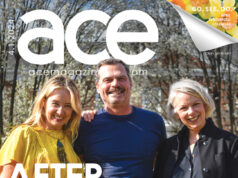by Bruce Burris
Where does it start? Muscles tense. One leg a pillar, holding the body upright between the earth and the sky. The other a pendulum, swinging from behind. Heel touches down. The whole weight of the body rolls forward onto the ball foot…. the most obvious and the most obscure thing in the world, this walking that wanders so readily into religion, philosophy, landscape, urban policy, anatomy and heartbreak.
—Rebecca Solnit: Wanderlust: A History of Walking
In Wanderlust: A History of Walking, art critic and writer Rebecca Solnit, presents an insightful treatise on the act of walking. In her book we are afforded an opportunity to examine the profound elements which serve to delineate the physical act of walking and to consider the cultural associations created when we partake in this most fundamental and necessary of our human efforts.
Some months ago Latitude Artist Community created a program called LifeLab. In it we pair a Mentor who already has a great knowledge of our community with a person considered by some to have a disability who may not have had much opportunity to wander out into the larger community. This notion of exploration much like Solnit’s, represents a tentative first step for some, which may eventually lead to an elevated community experience.
Enter Sherri McGee
Sherri McGee is from a well known musical family, she started playing the drums as a child and in between stints in LA and Austin has performed locally with The Twinkettes, The Royal Batfangs and Velvet Elvis but Sherri is especially well known for her famous Honky-Tonkin’ alter ego Little Miss Tammy Smith.
“Last spring I heard about what seemed to be the perfect job for me” said McGee. “Latitude was starting a new program called LifeLab and they were hiring a few Community Mentors. The mentoring program at LifeLab encourages active participation in the community and Lexington has so much to offer, so I applied.
“One of the people I mentor is Morgan. I work with him on developing and mastering certain basic life skills but more importantly we have explored many volunteer opportunities around town, and are currently helping others at five places every week. Residents at the nursing home and VA Center are becoming familiar with us and look forward to our visits each week. Morgan says these experiences differ from others in his past because ‘we work a lot’ and ‘I do a good job helping people.’ Morgan’s extensive knowledge of sports, current events, history, and politics are key when visiting older citizens and men at the VA. Morgan enjoys striking up a conversation with everybody. I assist Morgan with social skills, focus, and building a routine work week while showing him how to effectively be a part of our community.”
to effectively be a part of our community….
“This is what we are all about” echoes Melanie Qualls, LifeLab’s Supervisor. “LifeLab is a program of Latitude that provides Community Living Supports (CLS) a service funded through Medicaid’s SCL and Michelle P Waivers. The intention of the service and the purpose of our program are twofold. Working one on one a Mentor provides a participant with the guidance to develop basic life skills while simultaneously introducing that person to the potential of the larger community, a place where those skills may be more fully realized and appreciated. This is about finding your place and then giving back.
“We view Community Mentors as practitioners of a craft and we hire people (often artists) who are already well versed, like Sherri, in the way our community works.”
Supporting a person in their efforts to connect to their own community seems simple enough and occasionally it is, but Kentucky ranks dead last in employment opportunities for those with disabilities and first in a nationwide study ranking the general feeling of loneliness by those with disabilities. This is not to imply that the answer to loneliness is employment, most jobs offer a person with disabilities little more than a mop handle and yet another environment in which to experience a profound sense of isolation, but there is hope here and it lies within the connections that can be established between those who lead lives of isolation and our broader human neighborhood.
By choice we link our practice to the mystical and yet we depend on and administer LifeLab according to the dictates of bureaucracies which are often adversative to the well being of those we support. The cheapening of the quality of a life is a thing we are most opposed to, yet it is our place within this dichotomy which allows us to more fully appreciate the many wonderful opportunities we are afforded in this community, and so in this light we understand the need for walking….
For info on Life Lab, contact Melanie Qualls, Bruce Burris, Crystal Bader; latitudearts@yahoo.com







